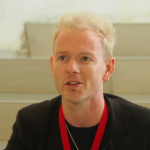
People
We bring together researchers from across disciplines to shed light on the social, technological, economic, managerial, organisational, political and ethical implications of the digital economy.
Director

Professor Annabelle Gawer
Chaired Professor in Digital Economy; Director, Centre of Digital Economy (CoDE)
Find an expert
We have expertise in a host of research areas.

Dr Atta Addo
Senior Lecturer in Digital Innovation and Enterpreneurship

Dr Cristina Alaimo
CoDE External Affiliate, SBS Visiting Researcher, Assistant Prof at LUISS in Digital Innovation and Data & Society

Haifa Alsughayer
Postgraduate Research Student

Dr Birgit Altrichter
Lecturer

Dr Carla Bonina
Associate Professor (Reader) in Entrepreneurship and Innovation

Professor Bonnie Buchanan
Associate Dean (International) - FABSS; REF Lead (UoA17); Director of Sustainable and Explainable FinTech (SAEF) Center, Immediate Past Head of Department of Finance and Accounting and Professor of Finance

Dr Itziar Castelló
CoDE External Affiliate, SBS Visiting Researcher Reader in Sustainability & Digital Economy at Bayes Business School

Lydia Certa
Postdoctoral Research Fellow and Sustainability Fellow at the Institute for Sustainability

Dr Daniel Cho
Senior Lecturer / Programme Lead (BSc Management with Entrepreneurship and Innovation) / Learning & Teaching Lead for DEEI

Dr Irina Cojuharenco
Reader, Founding Director of the University of Surrey Business and Economic Experiments (USBEE) Laboratory

Professor Ranjana Das
Professor

Professor MariaLaura Di Domenico
Associate Head of School Research and Innovation & Professor (Chair) of Entrepreneurship, Work and Organization

Dr Thomas Fackler
Senior Lecturer in Digital Economy, Entrepreneurship and Innovation

Hannah Gooding
Postgraduate Research Student

Dr Bahareh Heravi
Associate Professor (Reader) in AI and Media

Professor Adrian Hilton
Director Surrey Institute for People-Centred AI | Director of Centre for Vision, Speech and Signal Processing

Professor Paul Hodkinson
Professor of Sociology

Anna Holland
Associate Head of School, Education and Associate Professor in Management

William Lanham-New
Senior Lecturer

Dr Henry Lopez-Vega
CoDE External Affiliate, SBS Visiting Researcher

Christopher Mahon
Senior Lecturer in Entrepreneurship and Innovation

Dr Sebastiano Massaro
Associate Professor (Reader)

Dr Michael McGuire
Senior Lecturer

Felipe Merlano
Research Fellow

Dr Ekaterina Murzacheva
Head of Digital Economy, Entrepreneurship & Innovation, Senior Lecturer in Innovation and Entrepreneurship

Professor Glenn Parry
Professor of Digital Transformation; Associate Dean Research, Faculty of Arts, Business & Social Sciences; CoDirector DECaDE: EPSRC Centre for the Decentralised Digital Economy

Dr Valentina Pitardi
Senior Lecturer in Marketing

Dr Abdolreza Roshani
Lecturer (Assistant Professor) in Business Analytics

Jim Sears
Programme Director MSc in Entrepreneurship & Innovation Management; Senior Lecturer in Entrepreneurship and Innovation;

Dr Aldo Stornelli
Senior Lecturer in Digital Economy, Entrepreneurship and Innovation

Dr Mahdi Tavalaei
Senior Lecturer in Strategy and Digital Transformation

Dr Richard Tee
Associate Professor (Senior Lecturer) in Innovation and Entrepreneurship

Ijeoma Victor-Oguamalam
Postgraduate Research Student

Dr Wenqi Wei
Lecturer in Hospitality Management

Dr Senmao Xia
Senior Lecturer in Digital Economy, Entrepreneurship and Innovation / Doctoral Supervisor

Ying Zhang
PhD candidate

Shao Zhao
Postgraduate Research Student
